The Hurricane Blu-ray Movie
HomeThe Hurricane Blu-ray Movie 
Blu-ray + UV Digital CopyUniversal Studios | 1999 | 146 min | Rated R | Jan 07, 2014
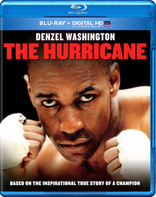
Movie rating
7.4 | / 10 |
Blu-ray rating
| Users | 4.8 | |
| Reviewer | 4.0 | |
| Overall | 4.2 |
Overview
The Hurricane (1999)
This film tells the story of Rubin "Hurricane" Carter, an African-American man who rose from a troubled youth to become a successful middleweight boxer. However, his life is shattered when he is accused of a triple murder, convicted and sentence to multiple life terms. Despite becoming a cause celebre and dogged efforts to prove his innocence through his autobiography, he remains imprisoned. Then, an African-American boy and his Canadian mentors read Carter's book and begin working for his exoneration.
Starring: Denzel Washington, Vicellous Shannon, Deborah Kara Unger, Liev Schreiber, John HannahDirector: Norman Jewison
| Sport | Uncertain |
| Biography | Uncertain |
| Drama | Uncertain |
Specifications
Video
Video codec: MPEG-4 AVC
Video resolution: 1080p
Aspect ratio: 1.85:1
Original aspect ratio: 1.85:1
Audio
English: DTS-HD Master Audio 5.1 (48kHz, 24-bit)
French: DTS 5.1
Subtitles
English SDH, French
Discs
50GB Blu-ray Disc
Single disc (1 BD)
UV digital copy
Mobile features
Packaging
Slipcover in original pressing
Playback
Region free
Review
Rating summary
| Movie | 4.5 | |
| Video | 4.0 | |
| Audio | 4.0 | |
| Extras | 3.0 | |
| Overall | 4.0 |
The Hurricane Blu-ray Movie Review
Hope Survives; Controversy Too
Reviewed by Michael Reuben January 30, 2014When The Hurricane was released in 1999, Rubin "Hurricane" Carter had been free for fourteen years, but the controversy surrounding his trials, convictions and over twenty years of incarceration remained undiminished. Even though Norman Jewison's film opened with a prominent disclaimer acknowledging that some of the events had been fictionalized, partisans leapt up nationwide to denounce the film for . . . fictionalizing. Jewison's work was excoriated as an undeserved makeover of a career criminal who had been sprung on a "technicality"—an odd claim when the "technical" point was that Carter's trial was fundamentally defective, resulting in an invalid conviction. When those same detractors went on to assert that Carter had yet to be "exonerated", they were picking and choosing among technicalities, because a person who has never been properly convicted is not obliged to exonerate himself. There is little doubt, though, that the anti-Hurricane campaign was effective in limiting the film's award prospects. It received only a single Oscar nomination for Denzel Washington's performance in the title role. And it is entirely possible that Washington's loss on Oscar night (to Kevin Spacey for American Beauty) was due in some measure to the negative campaign against the film. (Washington's victory two years later for Training Day had the kind of "makeup" element for which the Oscars have long been noted.) The controversy over Carter and his case has been revived by the release of The Hurricane on Blu-ray, as a glance at the IMDb forums will confirm. While the 1966 Lafayette Bar murders for which Carter was sent to prison lack the mythic dimension and historical significance that have made "the grassy knoll" and "the Zapruder film" into familiar catchphrases, the details are just as difficult to disentangle, with a melange of conflicting theories, testimony, unreliable witnesses, recantations, recantations of recantations, inept forensics, questionable prosecutorial decisions, a conspicuous lack of motive and, yes, Carter's previous criminal record, which he has never tried to conceal. Indeed, one of the major themes of both the film and Carter's autobiography, The Sixteenth Round, on which the film is partly based, is the former middleweight boxer's long battle against his toughest adversary: himself.
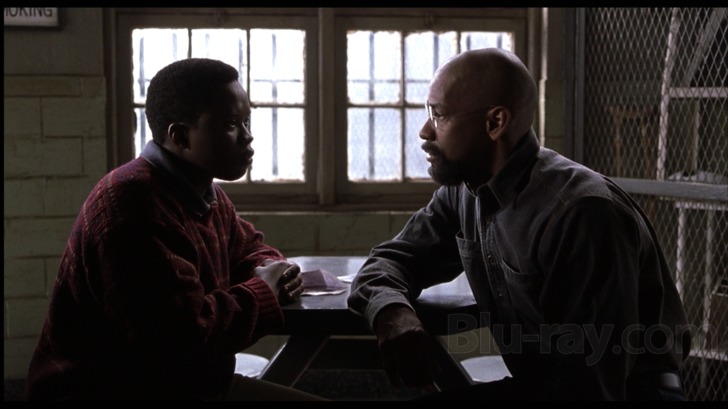
Jewison's film is based on a sophisticated and multi-layered script by producer Armyan Bernstein (who explains in the extras that he persuaded Carter to let him make the film by offering to write it himself) and Dan Gordon (Wyatt Earp). The story interweaves Carter's own history, beginning with his rough childhood on the streets of Patterson, New Jersey (where he is played by Mitchell Taylor Jr.), with that of a young boy from Brooklyn, Lesra Martin (Vicellous Reon Shannon), who begins corresponding with Carter in prison after reading The Sixteenth Round. By that point, Carter has been convicted in the second of two trials for the Lafayette Bar murders, and that conviction will be narrowly affirmed by the New Jersey Supreme Court in 1982. (The same court threw out the first conviction in 1976.) Lesra Martin's circumstances are unusual. He has been "adopted" by a group generally known, simply, as "the Canadians", a kind of commune of entrepreneurial do-gooders he met during a summer internship with the EPA. They offer to teach him to read, something the ailing New York City school system had failed to do. Lesra buys a copy of Carter's book at a used book sale; it's the first book he selects on his own, and everything about Carter's story feels familiar to him. In reality, the Canadians were a larger group, but in the film they are reduced to three: Lisa Peters (Deborah Kara Unger), Sam Chaiton (Liev Schreiber) and Terry Swinton (John Hannah). Sam and Terry would later write Lazarus and the Hurricane recounting their experience, which was also a source for the script. By the time Lesra and the Canadians enter Carter's life, he is largely alone, having passed through the cycle of celebrity that began when his autobiography was first published in 1974, prompting a Bob Dylan song, celebrity rallies and contributions to his defense fund. Those efforts helped get Carter a new trial, but then he was convicted a second time. (Also, in a disputed but highly publicized incident not included in the film, he was accused of attacking one of his supporters, which irreparably damaged his public image.) As the film flashes backward and forward between Carter's past and his present, and shifts locations between his New Jersey prison and Lesra's new home in Canada, it conveys a sense of the two men's distinct personalities, aided by their voiceover readings from correspondence and Carter's autobiography. Carter is reluctant to become emotionally involved with anyone on the outside, because he regards hope as the biggest obstacle to "doing the time". He has long ago insisted that his wife, Mae Thelma (Debbi Morgan), divorce him, and for as long as he can, he resists the friendship and assistance of the Canadians. But when his last state appeal is turned down, it is Lesra who insists that they all go to work assisting Carter's defense lawyers (David Paymer and Harris Yulin). The Canadians proceed to become the kind of dogged and intelligent investigative team of which defense attorneys dream, reviewing thousands of pages of testimony, tracking down forgotten witnesses and ultimately assembling much of the evidence that will persuade the federal courts to set aside Carter's conviction. Denzel Washington brings such innate reserves of goodwill to every role he plays that it can be easy to overlook his and Jewison's considerable efforts to portray Carter's dark side. But the intent is clear from the very opening, which intercuts a black-and-white recreation of Carter's 1963 bout against welterweight champion Emile Griffith with a kinetic sequence ten years later in his cell at Trenton State Prison, as inmate Carter prepares to do battle with dozens of guards in riot gear who are preparing to "toss" his cell. It's a hopeless, kamikaze fight fueled by rage, but the situation is calmed by Jimmy Williams, a humane guard who is sympathetic to "Hurricane". (In an intriguing piece of reverse typecasting, Jimmy is played by Clancy Brown, best known for playing villains, notably a corrupt prison guard in The Shawshank Redemption.) The opening establishes a critical element of Carter's character: his intense temper, his anger (righteous or not), his determination, as explained in passages of his autobiography, to transform himself into a "weapon" against all the forces he perceives opposing him. The same attitude resurfaces periodically, e.g., when Carter and his companion, John Artis (Garland Whitt), are first brought in on the night of the Lafayette Bar murders. Carter goes head to head with a racist cop, Della Pesca (Dan Hedaya), a composite character who represents all those who see Carter as a low-life who managed to earn a little money in the boxing ring and has now become "uppity". Trash-talking a cop under any circumstances is a bad idea, whether you're white or black, but Carter cannot resist. Later, when he first arrives in prison, Carter is thrown into solitary, where Jewison stages an unnerving confrontation among the competing voices inside Carter's head, as different parts of him battle for control. That battle is reprised years later, as Carter must overcome his suspicions and hostility when the Canadians offer their help. "Hate put me in prison. Love's gonna bust me out", says Carter to Lesra during a recess in the federal proceedings before Judge Lee Sarokin, who is played by Jewison stalwart Rod Steiger with sly understatement. It's a famous quotation, but its full meaning doesn't always register. The "hate" that put Carter in prison isn't just the systemic racism that, according to Judge Sarokin's decision, fatally infected his trial. It also refers to Carter's own hatred in response. The same fury that fueled his boxing skills also led him down a dangerous and destructive path that made him an ideal candidate for the charges that earned him multiple life sentences, despite the absence of solid evidence. Even in prison, Carter continued on that path of hardness, hate and isolation, but The Hurricane shows how a teenage boy, neither a celebrity nor a crusader, reached through the barriers that "The Hurricane" had built around himself and changed who he was. He became someone who can extend a hand instead of punching with it—someone who could not only accept love but also offer it in return. And those to whom Carter extended a hand proved instrumental in securing his freedom.
The Hurricane Blu-ray Movie, Video Quality 
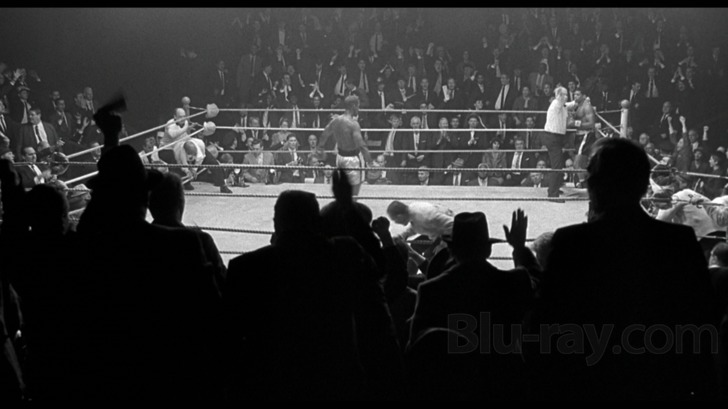
Throughout his commentary, director Jewison praises the work of cinematographer Roger Deakins (Skyfall and numerous films with the Coen Bros.) for his inventive lighting and camera moves that allowed Jewison to film so many scenes in the confined spaces of prison cells without becoming visually repetitive. Universal's 1080p, AVC-encoded Blu-ray is another good catalog effort, faithfully reproducing the many deep shadows and varied palette of Deakins' careful work. Black levels and details are consistently excellent. The subtle shifts in lighting and color temperature that accompany changes in time and place are carefully replicated (and they are essential to a film that jumps around as much as The Hurricane). The present-day scenes in prison, court, lawyers' offices and the streets of New Jersey favor cooler, bleaker tones, while the historical scenes of Carter's past, and the Canadian scenes of Lesra's present, are warmer and richer. The exceptions, of course, are the black-and-white boxing sequences and the heavily shaded night scenes that recreate the Lafayette Bar murders and their aftermath. If there is a criticism to be made of this presentation, it's that the film appears to have been slightly degrained, consistent with Universal's usual approach, and a touch of artificial sharpening can be observed, if one looks closely. However, the degraining does not appear to have come at the sacrifice of detail, and the sharpening has not created any noticeable edge halos or ringing. The average bitrate is a healthy 32 Mbps (technically, 31.995). No compression issues appeared.
The Hurricane Blu-ray Movie, Audio Quality 
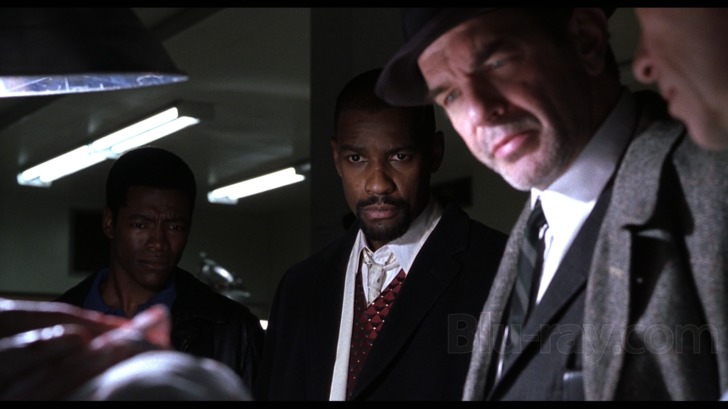
The film's original 5.1 mix is reproduced in lossless DTS-HD MA, and it fully captures the nuances of the sophisticated sound editing that whisks the viewer from one setting to another, e.g., back and forth between the roar of the crowd at the Hurricane/Griffith match and the clattering of boots on prison stairs in the opening montage. The subjective experience of Rubin "Hurricane" Carter battling his demons is conveyed with a sound montage of overlapping speeches spread across the front soundstage. (On the commentary track, Jewison describes how he himself would read one version during a take to give Denzel Washington something to play against.) The sounds of prison life (clanging doors, distant voices, klaxon alerts) play in the background. The haunting, foreboding score by Christopher Young (Copycat, Drag Me to Hell ) contributes a tone to the film that alternates between solemn and suspenseful.
The Hurricane Blu-ray Movie, Special Features and Extras 
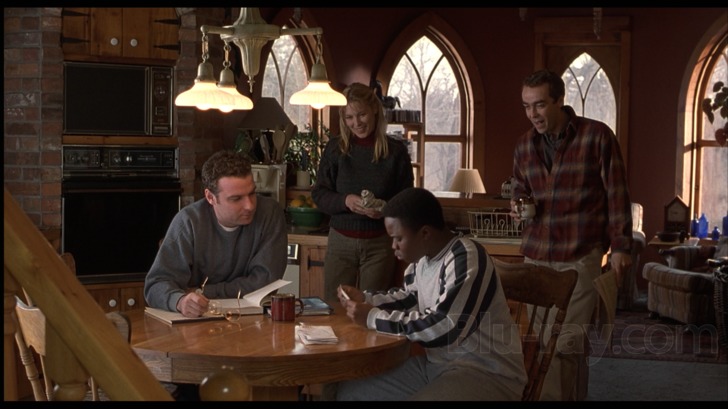
The extras have been ported over from Universal's 2003 DVD of The Hurricane, minus only the production notes and the DVD-ROM features.
- Commentary with Director Norman Jewison: This is one of Jewison's best commentaries, as he ranges freely over the technical challenges of the production as well as the history of the Carter case, his personal interactions with various real-life counterparts and his thoughts on the history of the prosecution and the underlying events. He repeatedly points out elements of the script that were fictionalized or invented for purposes of effective storytelling, including the climactic courtroom scene, which is dramatically essential but in no way resembles the procedure for adjudicating habeas corpus petitions. Jewison is philosophical about the controversy generated by the film and almost seems to accept it as a sign that the work was effective.
- Spotlight on Location: The Making of The Hurricane (480i; 1.33:1; 20:07): The highlight of this entry from the Universal "making of" series is interviews with the real Rubin "Hurricane" Carter and Lesra Martin.
- Deleted Scenes (w/Optional Special Introduction by Director Norman Jewison) (480i; 1.33:1 & 1.85:1; 20:20): The scenes cannot be separately selected, but Jewison provides an optional introduction to each. The most significant is one where Sam tracks down the cab driver who saw Carter at the Nite Spot after hearing the police radio alert that there had been the murders at the Lafayette Bar.
- Theatrical Trailer (480i; 1.85:1; 2:32).
The Hurricane Blu-ray Movie, Overall Score and Recommendation 
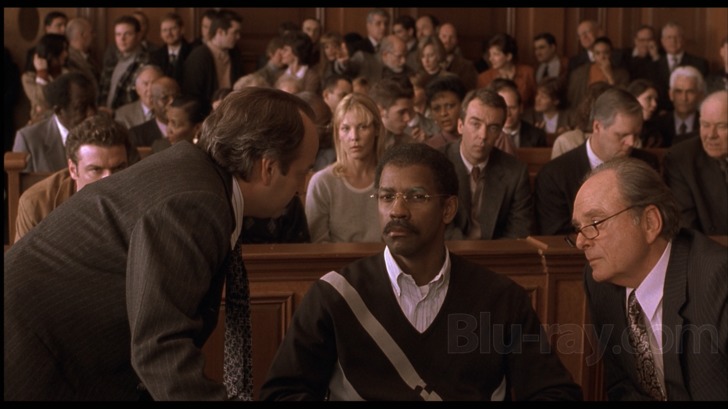
No person can be fully summed up in a two-and-a-half-hour film, but anyone who insists that The Hurricane turns Rubin "Hurricane" Carter into a saint either hasn't watched the film or has wilfully ignored large portions of it. Whatever one may think of Carter, it is beyond dispute that he spent over two decades in prison as the result of defective trials, because that was the conclusion of the legal system itself. The words spoken by Judge Sarokin in the film are a tiny excerpt of the lengthy, thoroughly researched and minutely reasoned opinion that he issued in granting Carter his freedom. As someone who worked for the federal courts (in a neighboring jurisdiction) during the period when Sarokin heard Carter's case, I am familiar with the sheer volume of habeas corpus petitions that pass through those courts and how quickly most are dispatched for lack of merit. A criminal conviction has to suffer from major deficiencies to be set aside on such a petition, and since district judges hate being reversed, they won't stick their necks out unless they are sure they can support the decision. Judge Sarokin was unanimously affirmed on appeal, and the State of New Jersey finally gave up trying to send The Hurricane back to prison. If you read the opinions, it's clear the State had no case. Highly recommended.
Similar titles
Similar titles you might also like

The Fighter
2010

Chuck
2017

Somebody Up There Likes Me
1956

42
Target Exclusive 30 mins of Bonus Content
2013

The Express
2008

Race
2016

Bleed for This
2016

Hands of Stone
2016

Ali
Commemorative Edition
2001

Prefontaine
1997

Moneyball
2011

Chasing Mavericks
2012

Rudy
1993

Raging Bull 4K
1980

Cinderella Man 4K
2005

Phantom Punch
2009

I Am Ali
2014

Without Limits
1998

The 5th Quarter
Special Edition
2010

King Richard
2021
